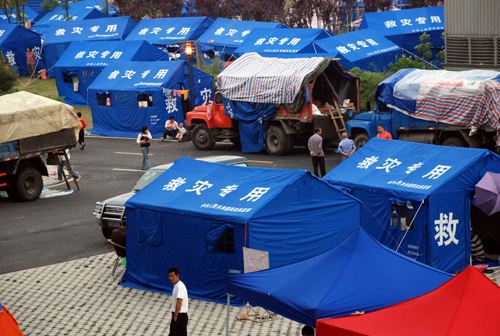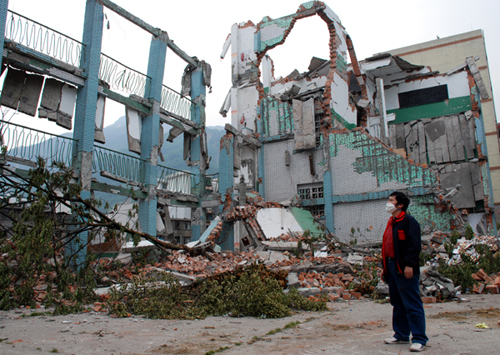The first of 6,000 temporary accommodation houses will be built in Mianyang, Beijing government and construction enterprises said yesterday. They will eventually help to build 80,000 such houses in disaster-hit areas. Premier Wen Jiabao also announced on Wednesday that the central government will allocate 70 billion yuan (US$10.14 billion) for a reconstruction fund. A 30-member committee of experts will offer scientific advice on quake relief and reconstruction.

Tent camps outside Jiuzhou Stadium.
The atmosphere here was less grim than what we saw in Mianzhu City and Hanwang Town on May 20, where 90 percent of buildings were either completely destroyed or are in a seriously dangerous condition, with hundreds of people still buried.
On the banks of the town's river, as breezes blow and the river flows from the foot of mountains, I can imagine this was a fascinating and peaceful place to live. Dongfang Steam Turbine Works, a major state-owned heavy mechanical production enterprise set up in the mid-1960s, and the pillar industry in the local region, has seen its factories, residential buildings and primary and middle schools collapse, killing thousands, including many children.

Debris of a middle school in Hanwang Town.
It was the most devastating sight I have ever witnessed. I stood in the middle of a ghost town, wearing a mask to shield off the smells.
Before arriving in Mianyang City the day before yesterday we heard a report that the Central Discipline Inspection Committee issued a notice on May 20, ordering relevant departments to keep strict trace of and strengthen the supervision of relief materials and funds in every disaster area.
We called the Department of Supervision of Sichuan Province to enquire about their plans. An official answering the phone said they have already sent out 12 work teams. Six are now in quake-hit areas including Deyang and Mianyang, and six are working with relief organizations like the Red Cross.
The work groups will oversee every phase of the receipt and distribution of relief materials. A phone number has been made available to the public to allow reporting of any concerns that local officials might be misappropriating or misusing emergency funds, and every two weeks a statistical update will be released to the people and to the international community.